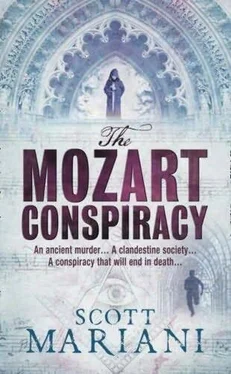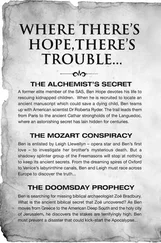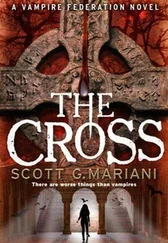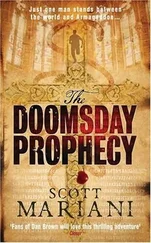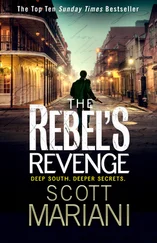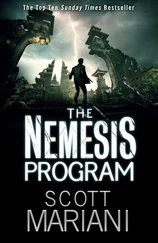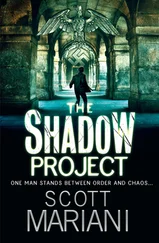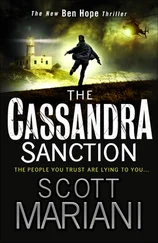‘Is there another Museo Visconti?’ Ben asked. He knew what the answer would be.
The old man shook his head again, like a mournful bloodhound. ‘I have been here for fifty years,’ he said. ‘There is only one.’
They walked away.
‘I had a feeling this wouldn’t lead anywhere,’ Leigh said.
‘But Arno donated something. The receipt proves it.’
They walked down a long corridor. On either side were rows of antique violins, violas and cellos behind glass. ‘He was a collector,’ she said. ‘He could have donated anything. A painting, an instrument.’ She pointed at the violins behind the glass. ‘Could have been one of these, for all we know.’
He stopped. ‘We’re idiots.’
‘What?’
‘It’s gone home,’ he said.
She stared at him in confusion.
‘It’s gone home ,’ he repeated. ‘Arno said the letter had gone home. It’s gone back to where it came from. He didn’t mean the museum itself. It’s never been here before.’
‘We’re in the wrong place?’
‘Maybe not,’ he said, looking up and down the corridor. ‘We need to find the piano exhibit.’
Understanding dawned on her face. ‘Shit, I think you might be right.’
‘Would you recognize your dad’s old piano if you saw it?’
‘You bet I would.’
Their footsteps rang fast off the parquet as they hurried back up the corridor to find the keyboard instruments section. Through an archway to the side, flanked with red drapes, they found it. The big room was full of old keyboard instruments, pianos, spinets and harpsichords, all highly restored and gleaming. They stood on plinths, cordoned off with DO NOT TOUCH signs on them.
Ben walked in among them. ‘Can you see it anywhere?’ he asked.
‘This is it,’ she said, pointing. She ran over to the old instrument near the window. It was big and ornate. Its woodwork gleamed dully under the museum lights. She circled it. ‘Christ, last time I saw this it was half restored, all stripped down to the bare wood and bits chipped off everywhere. But it’s definitely the one.’
‘You’re sure?’
‘I’d know it anywhere.’
Ben studied the piano carefully, running his eye over the heavily varnished surface, the mother-of-pearl inlays and the gleaming ivory and ebony keys. Over the top of the keyboard, in gold letters, was the maker’s name: Josef Bohm, Vienna. It had three intricately carved legs, two at the front and one holding up the long tail at the back. It was about twelve feet long, solid and heavy. ‘So remind me,’ he said. ‘Which leg was hollow?’
Leigh put her finger to the corner of her mouth, thinking. ‘It was one of the front ones.’
‘Left or right?’
‘Right, I think. No, left.’
Ben leaned over the security cordon, but he couldn’t get close enough to examine the piano properly. He glanced around. There was nobody in sight. He could hear the footsteps of the old security guard pacing through one of the adjacent rooms.
‘Right,’ she said. ‘Definitely the right front leg.’
‘You don’t sound too certain.’
‘I’m certain.’
Mounted on a bracket high in a corner, the small black eye of a security camera was watching them. Ben stepped away from the plinth and looked casual as he slipped into the camera’s blind spot and along the wall beneath it. He looked up. Then he walked back to the piano and stepped straight over the cordon. ‘The camera’s useless,’ he said to Leigh with a smile. ‘It’s almost as old as these pianos, and half the wires are disconnected at the back.’
‘That’s so typically Italian,’ Leigh replied.
‘Don’t knock it.’ He knelt down next to the piano and examined the front right leg up close. The instrument had been carefully restored and was in such perfect condition that it was hard to believe it was almost two centuries old. Ben couldn’t see anything. But then his eye picked out a small crack in the varnish three-quarters of the way up the leg. He scratched with his nail. Tiny scales of varnish flaked away to reveal what seemed to be a hairline saw-mark. He scratched a bit more. The saw-line extended right round the leg, but it was barely visible. Had someone been at the instrument since the last restoration, removed the hollowed-out leg, replaced it and then painted over the join with clear varnish?
There was only one way to find out.
Belgium
The same day
Philippe Aragon had been reading policy documents and signing letters at his study desk all morning, and the stack of papers at his elbow was a foot high. He liked to work from home whenever he could. He’d designed and built the house himself, back in his architect days. The Aragon family home near Brussels was simple and modest by his father’s billionaire standards, not at all like the fabulous chateau in which Philippe had spent his childhood. But Philippe was tired of opulence. Opulence was anyone’s for the money. It meant nothing.
As he worked, his eyes drifted from time to time to the framed pictures that sat on his desk. He had a whole collection of them, clustered together. His parents, his wife Colette. Vincent, his boy, riding the bicycle he’d had for his tenth birthday. Delphine, their beautiful four-year-old daughter, swinging on her swing with a glittering smile. And Roger. Dear old Roger.
Philippe was suddenly filled with sadness all over again as he thought about him. He laid down his pen and picked up the framed picture, studying it. His old friend and mentor looked up at him. He’d had such kind eyes. It was still hard to accept what had happened. Or to understand it.
To the political world, the man in the photo had been the Swiss-French former politician and highly respected statesman Roger Bazin. To Philippe, who had known him all his life, he was like an uncle. He’d taught Philippe a great deal, even though their political stance had radically diverged as Philippe got older. Roger hadn’t ever been completely comfortable with his protégé’s socialist and environmentalist leanings, and they’d spent many a night debating over a bottle of cognac. They might have agreed on less and less as time went by, but those intellectual wrestling matches with the elder statesman had proved an immensely valuable training ground for the young politician, shaping and sharpening his mind for the battles to come. Philippe had always considered Roger as part of the bedrock of his life, something that would never go away, like the old oak tree he could see from his study window.
It still hurt that he was gone. It hurt a great deal. And it hurt even more to think that Roger might have been involved in what had happened that night.
Those events of the previous winter were still, and would always remain, fresh and sharp in Philippe Aragon’s mind. He remembered the chalet in Cortina as though he’d been there just yesterday.
It had been one of those rare moments in his hectic new political career when he’d been able to reserve a whole six days to get away with Colette and the children. He’d been so happy to see the kids looking forward to it. He’d been planning to teach them to ski. More than anything, he’d been looking forward to spending time with Colette, the way they used to before things had got so crazy.
The nineteenth-century chalet was perfect, something out of a fairy-tale. Far away from anything, total silence, nothing around except mountains, forests, and clean, clean air.
On the second day he’d had the phone call. Few people had his private mobile number, just Colette, his secretary and a handful of family members and close friends.
It was Roger Bazin on the line. It had been the first time in a while that Philippe had heard from him. He’d sounded odd, his words a little slurred as though he’d been drinking. That was peculiar in itself, but there was something else, something stranger. It was the note of fear that Philippe had picked up on instantly. A tortured edge to Bazin’s voice that the younger man hadn’t heard before. What was wrong?
Читать дальше
Конец ознакомительного отрывка
Купить книгу
